Cyber Security Assignment: Threats, Actors, and Cyberwarfare Analysis
VerifiedAdded on 2022/08/29
|5
|1264
|19
Homework Assignment
AI Summary
This assignment delves into the realm of cyber security, examining the roles and threats posed by both state and non-state actors. It defines these actors, providing examples like Russian hackers and ISIS, and discusses the potential impacts of their actions on national sovereignty, integrity, and critical infrastructure. The assignment also outlines Clarke's five key takeaways from the genesis of cyberattacks, including the realities of cyberwar, its speed, global reach, ability to bypass traditional battlefields, and its current state of active engagement. It emphasizes the importance of understanding these takeaways for effective cyber defense, highlighting how awareness of these points can help nations prepare for and combat cyberattacks, which is changing the landscape of modern warfare and impacting all nations. The assignment concludes by emphasizing the importance of understanding the nature of cyber warfare and providing proper security to prevent cyberattacks.
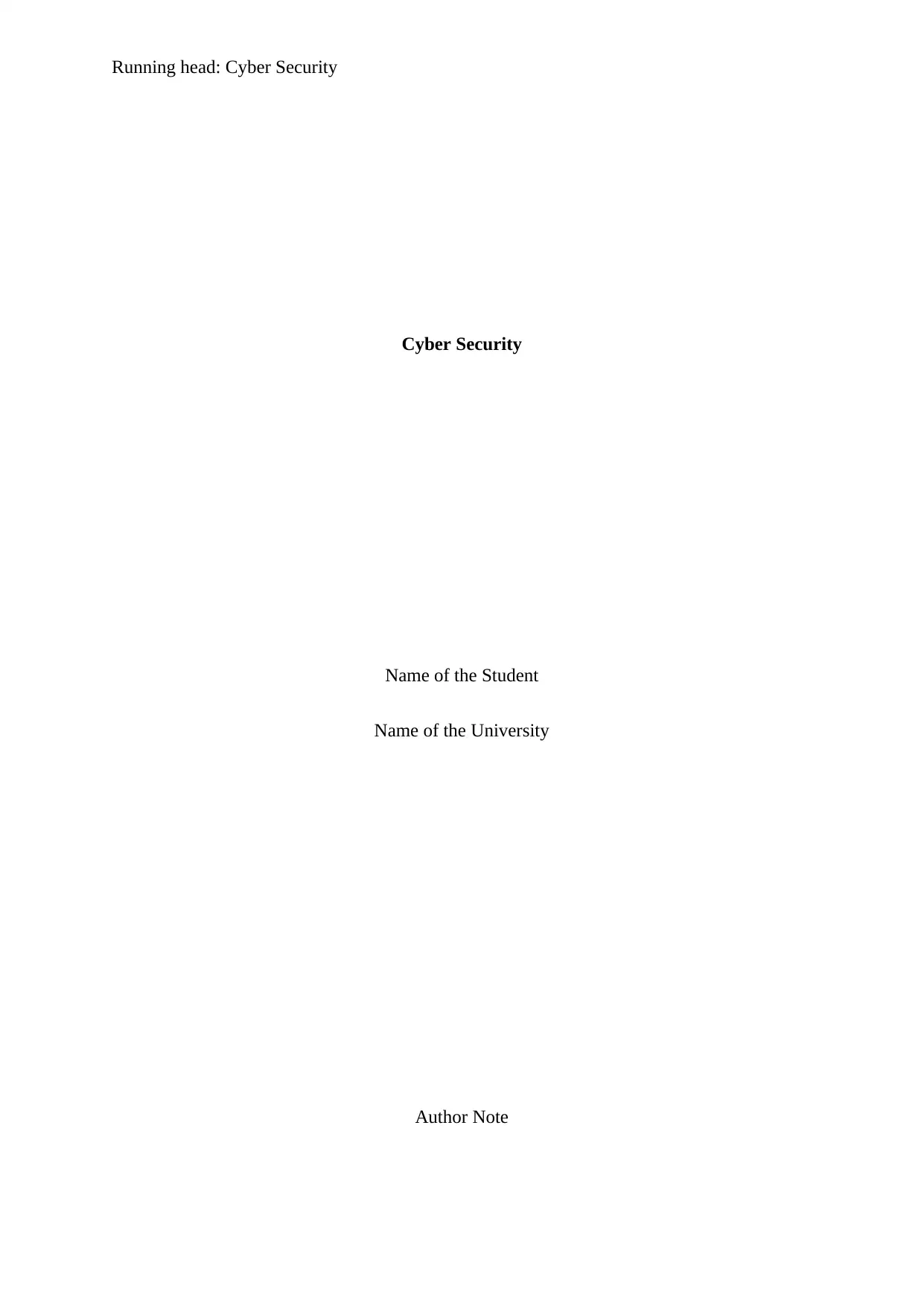
Running head: Cyber Security
Cyber Security
Name of the Student
Name of the University
Author Note
Cyber Security
Name of the Student
Name of the University
Author Note
Paraphrase This Document
Need a fresh take? Get an instant paraphrase of this document with our AI Paraphraser
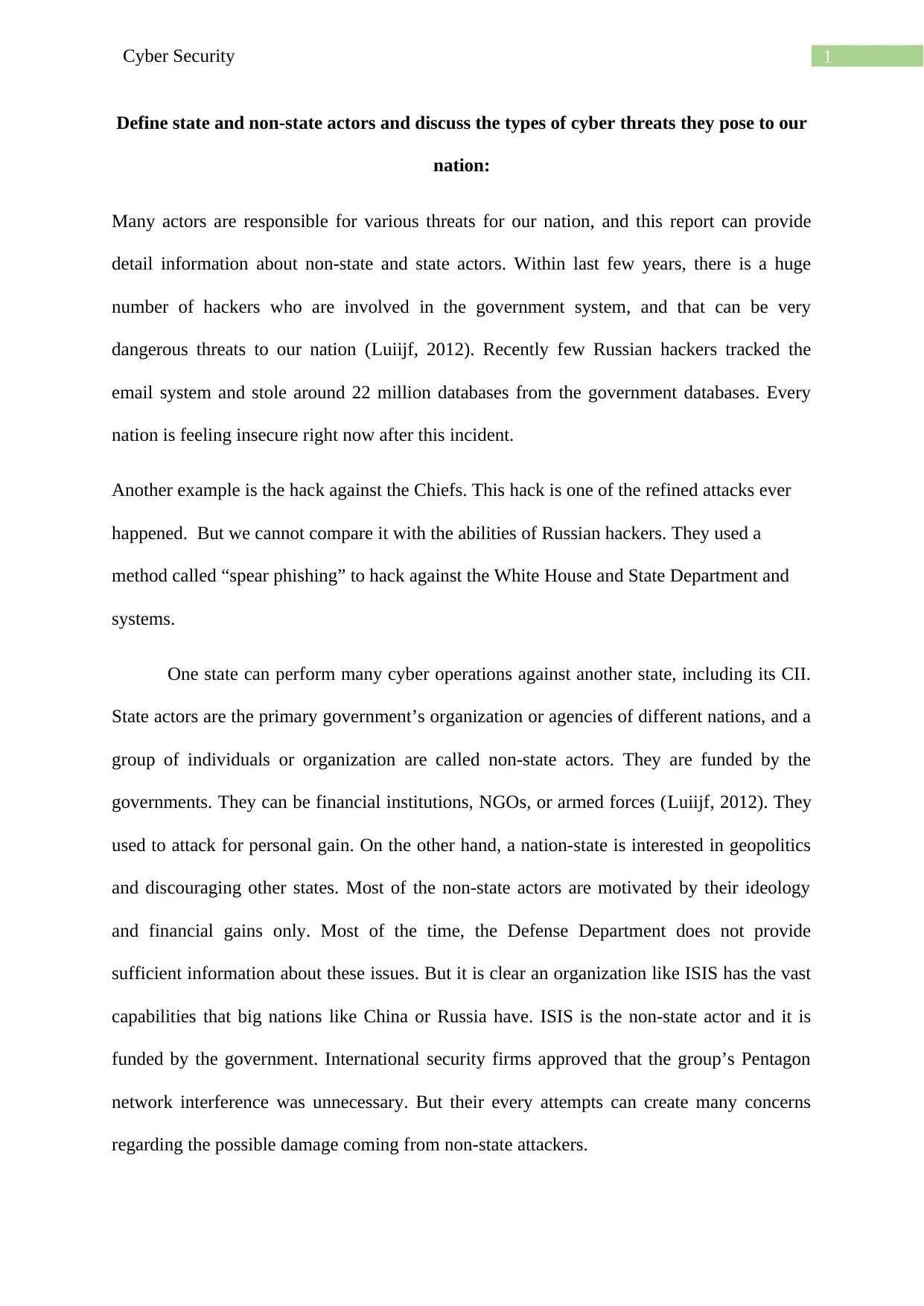
1Cyber Security
Define state and non-state actors and discuss the types of cyber threats they pose to our
nation:
Many actors are responsible for various threats for our nation, and this report can provide
detail information about non-state and state actors. Within last few years, there is a huge
number of hackers who are involved in the government system, and that can be very
dangerous threats to our nation (Luiijf, 2012). Recently few Russian hackers tracked the
email system and stole around 22 million databases from the government databases. Every
nation is feeling insecure right now after this incident.
Another example is the hack against the Chiefs. This hack is one of the refined attacks ever
happened. But we cannot compare it with the abilities of Russian hackers. They used a
method called “spear phishing” to hack against the White House and State Department and
systems.
One state can perform many cyber operations against another state, including its CII.
State actors are the primary government’s organization or agencies of different nations, and a
group of individuals or organization are called non-state actors. They are funded by the
governments. They can be financial institutions, NGOs, or armed forces (Luiijf, 2012). They
used to attack for personal gain. On the other hand, a nation-state is interested in geopolitics
and discouraging other states. Most of the non-state actors are motivated by their ideology
and financial gains only. Most of the time, the Defense Department does not provide
sufficient information about these issues. But it is clear an organization like ISIS has the vast
capabilities that big nations like China or Russia have. ISIS is the non-state actor and it is
funded by the government. International security firms approved that the group’s Pentagon
network interference was unnecessary. But their every attempts can create many concerns
regarding the possible damage coming from non-state attackers.
Define state and non-state actors and discuss the types of cyber threats they pose to our
nation:
Many actors are responsible for various threats for our nation, and this report can provide
detail information about non-state and state actors. Within last few years, there is a huge
number of hackers who are involved in the government system, and that can be very
dangerous threats to our nation (Luiijf, 2012). Recently few Russian hackers tracked the
email system and stole around 22 million databases from the government databases. Every
nation is feeling insecure right now after this incident.
Another example is the hack against the Chiefs. This hack is one of the refined attacks ever
happened. But we cannot compare it with the abilities of Russian hackers. They used a
method called “spear phishing” to hack against the White House and State Department and
systems.
One state can perform many cyber operations against another state, including its CII.
State actors are the primary government’s organization or agencies of different nations, and a
group of individuals or organization are called non-state actors. They are funded by the
governments. They can be financial institutions, NGOs, or armed forces (Luiijf, 2012). They
used to attack for personal gain. On the other hand, a nation-state is interested in geopolitics
and discouraging other states. Most of the non-state actors are motivated by their ideology
and financial gains only. Most of the time, the Defense Department does not provide
sufficient information about these issues. But it is clear an organization like ISIS has the vast
capabilities that big nations like China or Russia have. ISIS is the non-state actor and it is
funded by the government. International security firms approved that the group’s Pentagon
network interference was unnecessary. But their every attempts can create many concerns
regarding the possible damage coming from non-state attackers.
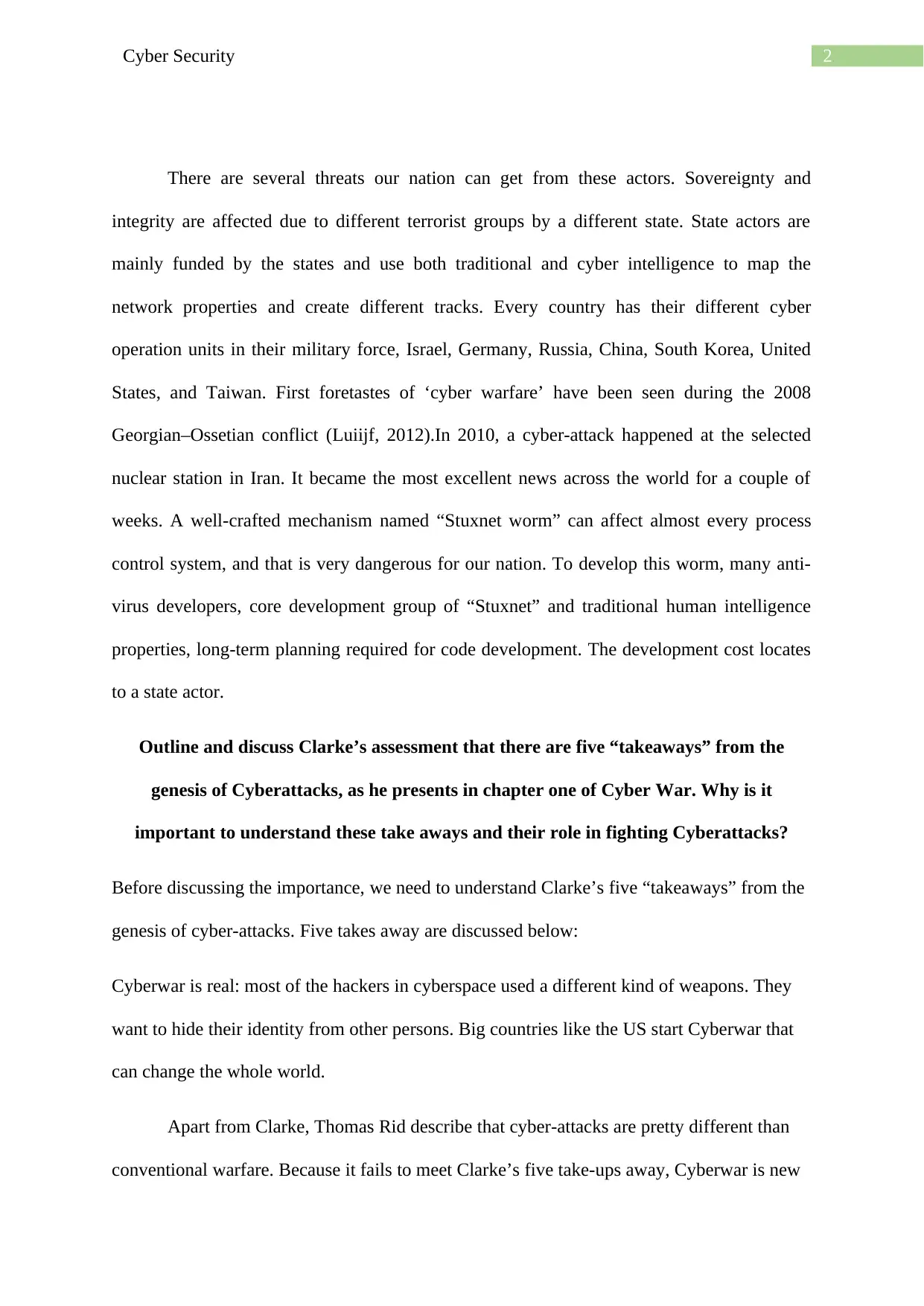
2Cyber Security
There are several threats our nation can get from these actors. Sovereignty and
integrity are affected due to different terrorist groups by a different state. State actors are
mainly funded by the states and use both traditional and cyber intelligence to map the
network properties and create different tracks. Every country has their different cyber
operation units in their military force, Israel, Germany, Russia, China, South Korea, United
States, and Taiwan. First foretastes of ‘cyber warfare’ have been seen during the 2008
Georgian–Ossetian conflict (Luiijf, 2012).In 2010, a cyber-attack happened at the selected
nuclear station in Iran. It became the most excellent news across the world for a couple of
weeks. A well-crafted mechanism named “Stuxnet worm” can affect almost every process
control system, and that is very dangerous for our nation. To develop this worm, many anti-
virus developers, core development group of “Stuxnet” and traditional human intelligence
properties, long-term planning required for code development. The development cost locates
to a state actor.
Outline and discuss Clarke’s assessment that there are five “takeaways” from the
genesis of Cyberattacks, as he presents in chapter one of Cyber War. Why is it
important to understand these take aways and their role in fighting Cyberattacks?
Before discussing the importance, we need to understand Clarke’s five “takeaways” from the
genesis of cyber-attacks. Five takes away are discussed below:
Cyberwar is real: most of the hackers in cyberspace used a different kind of weapons. They
want to hide their identity from other persons. Big countries like the US start Cyberwar that
can change the whole world.
Apart from Clarke, Thomas Rid describe that cyber-attacks are pretty different than
conventional warfare. Because it fails to meet Clarke’s five take-ups away, Cyberwar is new
There are several threats our nation can get from these actors. Sovereignty and
integrity are affected due to different terrorist groups by a different state. State actors are
mainly funded by the states and use both traditional and cyber intelligence to map the
network properties and create different tracks. Every country has their different cyber
operation units in their military force, Israel, Germany, Russia, China, South Korea, United
States, and Taiwan. First foretastes of ‘cyber warfare’ have been seen during the 2008
Georgian–Ossetian conflict (Luiijf, 2012).In 2010, a cyber-attack happened at the selected
nuclear station in Iran. It became the most excellent news across the world for a couple of
weeks. A well-crafted mechanism named “Stuxnet worm” can affect almost every process
control system, and that is very dangerous for our nation. To develop this worm, many anti-
virus developers, core development group of “Stuxnet” and traditional human intelligence
properties, long-term planning required for code development. The development cost locates
to a state actor.
Outline and discuss Clarke’s assessment that there are five “takeaways” from the
genesis of Cyberattacks, as he presents in chapter one of Cyber War. Why is it
important to understand these take aways and their role in fighting Cyberattacks?
Before discussing the importance, we need to understand Clarke’s five “takeaways” from the
genesis of cyber-attacks. Five takes away are discussed below:
Cyberwar is real: most of the hackers in cyberspace used a different kind of weapons. They
want to hide their identity from other persons. Big countries like the US start Cyberwar that
can change the whole world.
Apart from Clarke, Thomas Rid describe that cyber-attacks are pretty different than
conventional warfare. Because it fails to meet Clarke’s five take-ups away, Cyberwar is new
⊘ This is a preview!⊘
Do you want full access?
Subscribe today to unlock all pages.

Trusted by 1+ million students worldwide
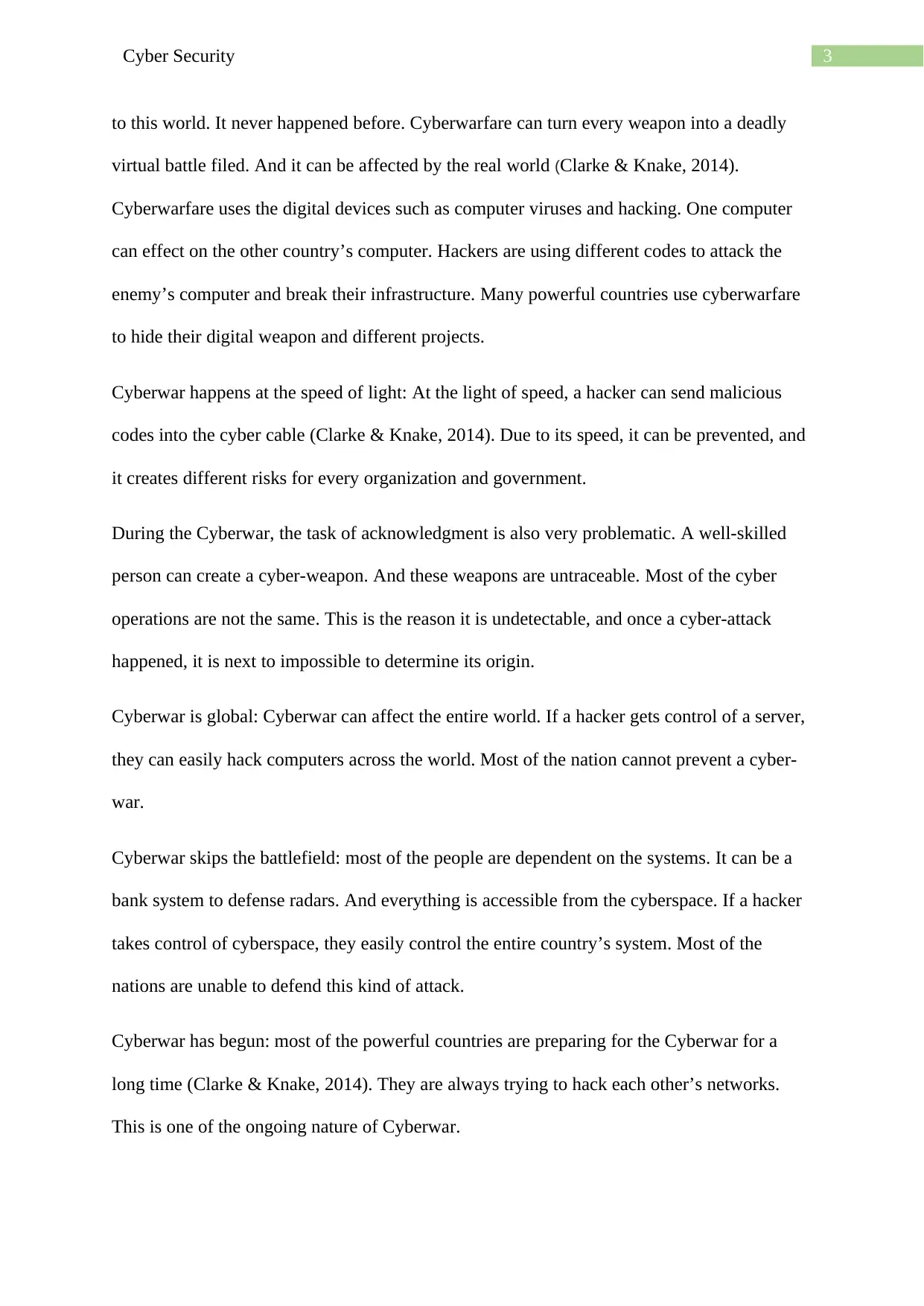
3Cyber Security
to this world. It never happened before. Cyberwarfare can turn every weapon into a deadly
virtual battle filed. And it can be affected by the real world (Clarke & Knake, 2014).
Cyberwarfare uses the digital devices such as computer viruses and hacking. One computer
can effect on the other country’s computer. Hackers are using different codes to attack the
enemy’s computer and break their infrastructure. Many powerful countries use cyberwarfare
to hide their digital weapon and different projects.
Cyberwar happens at the speed of light: At the light of speed, a hacker can send malicious
codes into the cyber cable (Clarke & Knake, 2014). Due to its speed, it can be prevented, and
it creates different risks for every organization and government.
During the Cyberwar, the task of acknowledgment is also very problematic. A well-skilled
person can create a cyber-weapon. And these weapons are untraceable. Most of the cyber
operations are not the same. This is the reason it is undetectable, and once a cyber-attack
happened, it is next to impossible to determine its origin.
Cyberwar is global: Cyberwar can affect the entire world. If a hacker gets control of a server,
they can easily hack computers across the world. Most of the nation cannot prevent a cyber-
war.
Cyberwar skips the battlefield: most of the people are dependent on the systems. It can be a
bank system to defense radars. And everything is accessible from the cyberspace. If a hacker
takes control of cyberspace, they easily control the entire country’s system. Most of the
nations are unable to defend this kind of attack.
Cyberwar has begun: most of the powerful countries are preparing for the Cyberwar for a
long time (Clarke & Knake, 2014). They are always trying to hack each other’s networks.
This is one of the ongoing nature of Cyberwar.
to this world. It never happened before. Cyberwarfare can turn every weapon into a deadly
virtual battle filed. And it can be affected by the real world (Clarke & Knake, 2014).
Cyberwarfare uses the digital devices such as computer viruses and hacking. One computer
can effect on the other country’s computer. Hackers are using different codes to attack the
enemy’s computer and break their infrastructure. Many powerful countries use cyberwarfare
to hide their digital weapon and different projects.
Cyberwar happens at the speed of light: At the light of speed, a hacker can send malicious
codes into the cyber cable (Clarke & Knake, 2014). Due to its speed, it can be prevented, and
it creates different risks for every organization and government.
During the Cyberwar, the task of acknowledgment is also very problematic. A well-skilled
person can create a cyber-weapon. And these weapons are untraceable. Most of the cyber
operations are not the same. This is the reason it is undetectable, and once a cyber-attack
happened, it is next to impossible to determine its origin.
Cyberwar is global: Cyberwar can affect the entire world. If a hacker gets control of a server,
they can easily hack computers across the world. Most of the nation cannot prevent a cyber-
war.
Cyberwar skips the battlefield: most of the people are dependent on the systems. It can be a
bank system to defense radars. And everything is accessible from the cyberspace. If a hacker
takes control of cyberspace, they easily control the entire country’s system. Most of the
nations are unable to defend this kind of attack.
Cyberwar has begun: most of the powerful countries are preparing for the Cyberwar for a
long time (Clarke & Knake, 2014). They are always trying to hack each other’s networks.
This is one of the ongoing nature of Cyberwar.
Paraphrase This Document
Need a fresh take? Get an instant paraphrase of this document with our AI Paraphraser
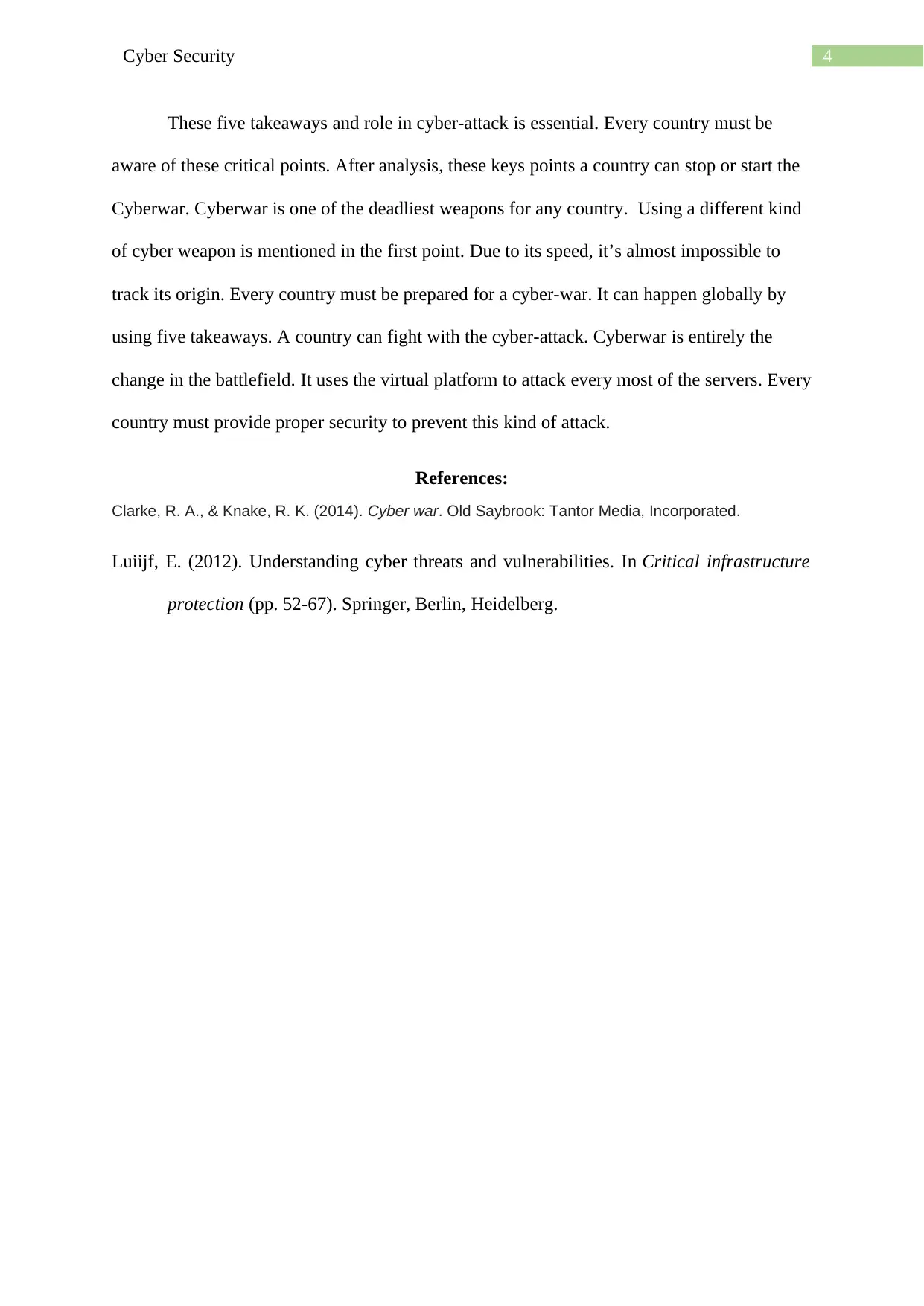
4Cyber Security
These five takeaways and role in cyber-attack is essential. Every country must be
aware of these critical points. After analysis, these keys points a country can stop or start the
Cyberwar. Cyberwar is one of the deadliest weapons for any country. Using a different kind
of cyber weapon is mentioned in the first point. Due to its speed, it’s almost impossible to
track its origin. Every country must be prepared for a cyber-war. It can happen globally by
using five takeaways. A country can fight with the cyber-attack. Cyberwar is entirely the
change in the battlefield. It uses the virtual platform to attack every most of the servers. Every
country must provide proper security to prevent this kind of attack.
References:
Clarke, R. A., & Knake, R. K. (2014). Cyber war. Old Saybrook: Tantor Media, Incorporated.
Luiijf, E. (2012). Understanding cyber threats and vulnerabilities. In Critical infrastructure
protection (pp. 52-67). Springer, Berlin, Heidelberg.
These five takeaways and role in cyber-attack is essential. Every country must be
aware of these critical points. After analysis, these keys points a country can stop or start the
Cyberwar. Cyberwar is one of the deadliest weapons for any country. Using a different kind
of cyber weapon is mentioned in the first point. Due to its speed, it’s almost impossible to
track its origin. Every country must be prepared for a cyber-war. It can happen globally by
using five takeaways. A country can fight with the cyber-attack. Cyberwar is entirely the
change in the battlefield. It uses the virtual platform to attack every most of the servers. Every
country must provide proper security to prevent this kind of attack.
References:
Clarke, R. A., & Knake, R. K. (2014). Cyber war. Old Saybrook: Tantor Media, Incorporated.
Luiijf, E. (2012). Understanding cyber threats and vulnerabilities. In Critical infrastructure
protection (pp. 52-67). Springer, Berlin, Heidelberg.
1 out of 5
Related Documents
Your All-in-One AI-Powered Toolkit for Academic Success.
+13062052269
info@desklib.com
Available 24*7 on WhatsApp / Email
![[object Object]](/_next/static/media/star-bottom.7253800d.svg)
Unlock your academic potential
Copyright © 2020–2026 A2Z Services. All Rights Reserved. Developed and managed by ZUCOL.




